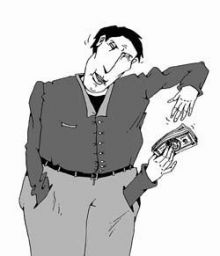The Ukrainian government’s partially rejuvenated economic bloc must pass a professional aptitude exam by pushing through parliament a budget bill on which every political force will want to leave its mark by highlighting the main points that are of interest to their respective electorates.
In Ukraine, the budget debate is traditionally conducted in the key of “development budget or an erosive budget”, says Ihor Burakovsky, director of the Institute for Economic Studies and Political Consultations (IESPC). In his opinion, only the political aspect of the process is discussed. As a result, budgets are passed practically without any input from experts, because as a rule independent political analysts are not involved in deliberations of the country’s main financial documents, making do with discussions in parliament and cabinet. After studying the current bill, IESPC experts have concluded that it is practically no different from the previous ones; it features traditional approaches and what is worse, it is almost unrealizable. They believe that the government is trying to present the situation in the country as being far more attractive than it actually is before the elections.
Experts mainly blame the macroeconomic forecast. After Viktor Pynzenyk declared that the government is counting on GDP growth of 7 percent and an 8.7 percent inflation rate, practically anyone who is more or less familiar with economics said that this is unrealistic and that the cabinet will not be able to achieve this. IESPC forecasts show that next year’s GDP will be considerably lower (4.4 percent), meaning 21 billion hryvnias fewer than the government has predicted. Considering this year’s GDP growth rate, the opinions of experts appear more realistic than the cabinet’s. If this prognosis proves true, Ukraine will be facing colossal gaps in the budget.
Experts also say that the government is wrong with regard to certain indices that have a concrete impact on GDP growth rate. Cabinet is once again counting on the possibility that foreign businesses will trust in the changes happening in Ukraine and rush to make investments in the Ukrainian economy. The Ministry of Finance predicts an 8.4 percent investment increment. Experts, however, warn that the constant political changes, constitutional reform, and reprivatization are not improving this country’s international image; their forecast is two times lower: 4.3 percent.
It is precisely the population’s nominal incomes that will affect the inflation rate. The government is predicting 8.7 percent inflation, while the IESPC expects 9.2 percent. Another possibility is that in fact inflation will be higher than both prognoses, as it may be affected by the privatization process. IESPC expert Vitaly Bihdai noted that next year the largest revenue from the sale of state enterprises in Ukraine’s history — 8.13 billion hryvnias — is planned. However, this forecast will only come true if such enterprises are sold at maximum prices. In other words, the state will have to part with Ukrtelecom. But even now it is anyone’s guess whether the government will agree to sell it.
Experts have pinpointed a number of articles in the revenue part of the budget, which they call unrealistic. According to IESPC forecasts, the fiscal gap in the budget may reach 0.7 percent GDP. There are countless reasons, starting with the excessive forecast optimism of the bill’s authors and ending with the very real prospects of failing to implement the 2005 budget. This failure may cause GDP debts and early tax payments. Sooner or later these debts will have to be paid, and then it will be difficult to find the money for this and ensure a proper level of budget revenues. However, experts positively note that this government has not raised individual taxes but retained the broad taxation base.
The revenue part of the budget is not the only target of criticisms. Scheduled expenditures on development, which have increased to 20 percent of the budget, do not in any way guarantee that this money will be spent on the designated purposes. Another problem is the state’s task to develop the entire infrastructure instead of artificially stimulating certain branches.
One of the main problems with this budget and its corollary, inflation growth, is the scheduled pension increase. The budget envisages a Pension Fund deficit of 11 billion hryvnias. Is this a lot or a little? Opinions vary. Experts are convinced, however, that the total budget deficit may well spark another economic crisis, as a result of which the government may have to resign at the end of the next fiscal year.
As Burakovsky noted, the reason behind all this is that we regard a budget program as a one-time occurrence. Meanwhile, no one is thinking about a medium-term development program. There are shortcomings in every budget, but they are hidden from the public eye. If some alarming signals filter through, they are attributed to the treachery of opponents. Experts are aware that the current budget bill was devised by a somewhat different cabinet, but they doubt that anyone will attempt to lower this budget from the sky to the earth.
* * *
As the Ministry of Finance informed The Day on Oct. 3, the budget’s revenue plan for September and the first nine months of the current year has been fulfilled. According to the State Treasury of Ukraine, revenues to the general fund of the state budget (including official transfers) total 6.4 billion hryvnias — 156 percent compared to September 2004; the total for the first nine months of 2005 was 60.5 billion hryvnias, 163.4 percent compared to the same period last year. “It should be noted that the VAT refunding schedule has been overfulfilled this month for the second time, compared to confirmed budget indices,” announced Finance Minister Viktor Pynzenyk, adding that “compared to January-July of this year, when refunds amounted to 81.1 percent of planned budgetary disbursements, during the first nine months of this year 87 percent of VAT refunds was achieved.”
(When using this data, please acknowledge www.minfin.gov.ua)







